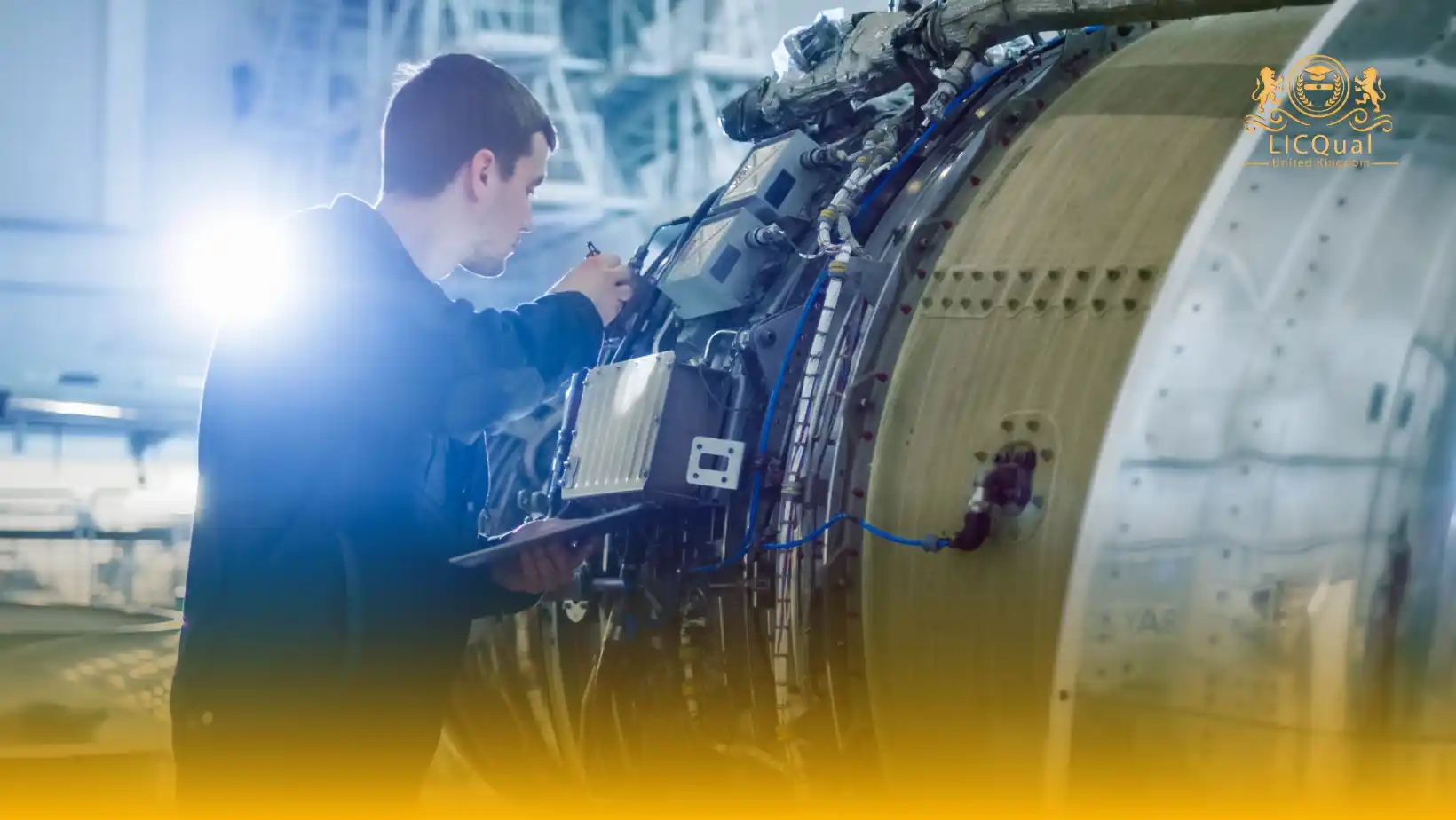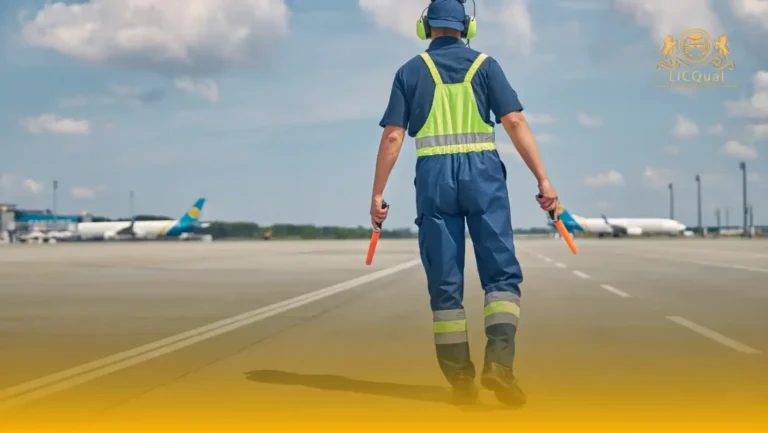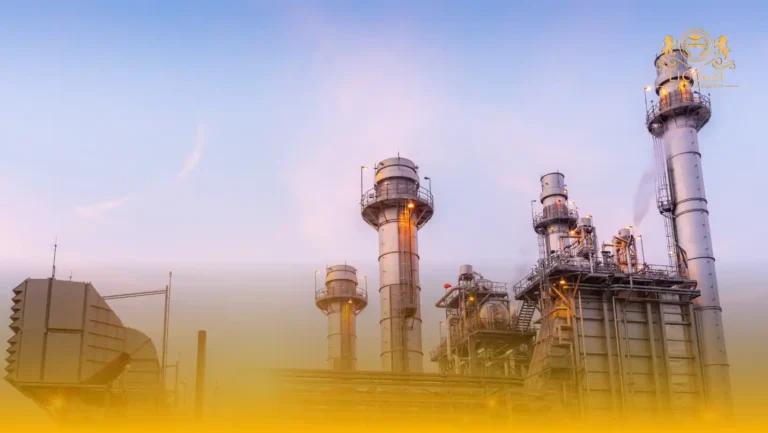The LICQual UK Level 6 Diploma in Aircraft Maintenance and Engineering Fundamentals is an advanced qualification designed for learners who want to take their aviation career to the next level. This internationally recognized program builds on core engineering knowledge and provides the specialist skills needed to succeed in senior aircraft maintenance and engineering roles.
Unlike entry-level qualifications, this Level 6 Diploma in Aircraft Maintenance and Engineering Fundamentals focuses on advanced technical expertise, leadership, and compliance with international aviation standards. It is ideal for learners who already have a foundation in aviation or engineering and are ready to progress into supervisory or management-level positions within the global aviation industry.
Throughout the course, students will explore advanced aerodynamics, propulsion systems, avionics, and aircraft performance, while also developing strong analytical and problem-solving skills. The program emphasizes practical application, ensuring that learners can confidently apply engineering principles to real-world maintenance and troubleshooting scenarios. With a strong focus on aviation legislation, safety, and quality assurance, graduates are prepared to meet the strict regulatory requirements of organizations such as ICAO, EASA, and CAA.
One of the key strengths of the LICQual UK Level 6 Diploma in Aircraft Maintenance and Engineering Fundamentals is its global recognition. Whether you are aiming to work with international airlines, maintenance organizations, or pursue further academic study, this qualification provides a clear pathway to career advancement. The combination of technical depth, regulatory knowledge, and applied research makes it a valuable credential for professionals seeking long-term growth in the aviation sector.
By enrolling in this UK-accredited Level 6 Diploma, learners gain not only advanced technical knowledge but also the confidence to lead teams, ensure compliance, and contribute to the safety and efficiency of modern aviation. This diploma is more than a qualification—it is a gateway to global opportunities in aircraft maintenance and engineering.
Course Overview
Qualification Title
LICQual UK Level 6 Diploma in Aircraft Maintenance and Engineering Fundamentals
Total Units
6
Total Credits
120
GLH
480
Qualification #
LICQ2201272
Qualification Specification
To enroll in the LICQual UK Level 6 Diploma in Aircraft Maintenance and Engineering Fundamentals, applicants must meet the following criteria:
|
Qualification# |
Unit Title |
Credits |
GLH |
|---|---|---|---|
|
LICQ2201272-1 |
Advanced Aerodynamics, Aircraft Performance, and Flight Mechanics |
20 |
80 |
|
LICQ2201272-2 |
Aircraft Propulsion Systems and Powerplant Engineering |
20 |
80 |
|
LICQ2201272-3 |
Avionics, Electrical, and Instrumentation Systems |
20 |
80 |
|
LICQ2201272-4 |
Advanced Aircraft Maintenance Procedures and Troubleshooting |
20 |
80 |
|
LICQ2201272-5 |
Aviation Legislation, Quality Assurance, and Compliance Management |
20 |
80 |
|
LICQ2201272-6 |
Applied Research Project in Aircraft Engineering Fundamentals |
20 |
80 |
By the end of this course, learners will be able to:
Advanced Aerodynamics, Aircraft Performance, and Flight Mechanics
Learners will be able to:
- Analyze advanced aerodynamic principles and their impact on aircraft performance.
- Evaluate flight mechanics including stability, control, and maneuverability.
- Apply performance calculations to real-world flight operations and engineering tasks.
- Assess the effects of environmental conditions on aircraft performance and safety.
- Interpret aerodynamic data to support maintenance and engineering decisions.
- Demonstrate knowledge of international standards in flight performance analysis.
Aircraft Propulsion Systems and Powerplant Engineering
Learners will be able to:
- Explain the design, operation, and performance of piston, turbine, and jet engines.
- Diagnose common issues in propulsion systems using advanced troubleshooting methods.
- Apply engineering principles to optimize powerplant efficiency and reliability.
- Evaluate maintenance procedures for compliance with international aviation standards.
- Analyze the environmental and safety considerations of aircraft propulsion systems.
- Demonstrate practical understanding of powerplant engineering documentation.
Avionics, Electrical, and Instrumentation Systems
Learners will be able to:
- Describe the function and integration of avionics, electrical, and instrumentation systems.
- Apply diagnostic tools to identify and resolve faults in avionics and electrical circuits.
- Evaluate the role of digital systems and automation in modern aircraft.
- Interpret wiring diagrams, schematics, and technical manuals accurately.
- Ensure compliance with international aviation standards for avionics maintenance.
- Demonstrate effective troubleshooting of complex electrical and instrumentation systems.
Advanced Aircraft Maintenance Procedures and Troubleshooting
Learners will be able to:
- Apply advanced maintenance techniques to ensure aircraft airworthiness.
- Diagnose and resolve complex faults in aircraft systems and structures.
- Evaluate maintenance schedules and procedures for efficiency and compliance.
- Demonstrate safe use of advanced tools, equipment, and diagnostic technologies.
- Implement predictive and preventive maintenance strategies in aviation.
- Align maintenance practices with ICAO, EASA, and CAA international standards.
Aviation Legislation, Quality Assurance, and Compliance Management
Learners will be able to:
- Interpret international aviation legislation and regulatory frameworks.
- Apply quality assurance principles to aircraft maintenance and engineering.
- Evaluate compliance requirements for safety, documentation, and certification.
- Demonstrate knowledge of auditing processes in aviation organizations.
- Develop strategies to ensure continuous improvement in aviation compliance.
- Promote a culture of safety, accountability, and regulatory adherence.
Applied Research Project in Aircraft Engineering Fundamentals
Learners will be able to:
- Design and conduct an applied research project in aircraft maintenance or engineering.
- Collect, analyze, and interpret aviation-related data using research methodologies.
- Apply critical thinking to solve real-world aviation engineering challenges.
- Present research findings in a professional, technical, and well-documented format.
- Evaluate the impact of research outcomes on aviation safety and engineering practices.
- Demonstrate independent learning, project management, and academic integrity.
The LICQual UK Level 6 Diploma in Aircraft Maintenance and Engineering Fundamentals is designed for learners who want to advance their careers in aviation engineering and maintenance. This internationally recognized qualification is ideal for professionals aiming for senior roles, international students seeking UK-accredited credentials, and individuals who want to combine advanced technical expertise with leadership and compliance knowledge. Whether you are an aspiring aviation manager, a working technician, or a career changer, this diploma provides the skills and recognition needed to succeed in the global aviation industry.
1. Experienced Aircraft Maintenance Technicians
- Professionals with prior aviation maintenance experience seeking career advancement.
- Technicians aiming to move into supervisory or management-level roles.
- Learners who want to deepen their knowledge of advanced aircraft systems.
- Individuals preparing for licensing pathways such as EASA B1/B2.
- Aviation workers seeking a globally recognized UK-accredited qualification.
2. Aviation Engineers and Technical Specialists
- Engineers working in mechanical, electrical, or aerospace fields.
- Professionals looking to specialize in aircraft propulsion, avionics, or performance.
- Individuals aiming to enhance their technical expertise with advanced study.
- Learners preparing for leadership roles in engineering and maintenance.
- Candidates seeking international recognition for their engineering skills.
3. International Students Seeking UK Accreditation
- Learners from overseas who want a UK Level 6 Diploma in Aircraft Maintenance.
- Students aiming to meet global aviation education and compliance standards.
- Candidates planning to pursue further aviation studies in the UK or abroad.
- Learners seeking qualifications aligned with ICAO and EASA frameworks.
- International students targeting global career opportunities in aviation.
4. Aviation Managers and Supervisors in Training
- Professionals preparing for leadership and compliance-focused roles.
- Learners aiming to combine technical knowledge with management skills.
- Individuals interested in aviation legislation, safety, and quality assurance.
- Candidates seeking to oversee maintenance teams and ensure compliance.
- Future supervisors aiming to meet international aviation management standards.
5. Career Changers and Adult Learners
- Adults considering a transition into the aviation and aerospace industry.
- Learners seeking a structured pathway into advanced aviation engineering.
- Individuals motivated to gain both technical and leadership skills.
- Professionals from related industries aiming to re-skill for aviation.
- Candidates looking for a qualification that enhances employability worldwide.
6. Aspiring Aviation Researchers and Innovators
- Learners interested in conducting applied research in aviation engineering.
- Candidates aiming to contribute to innovation in aircraft maintenance practices.
- Individuals preparing for postgraduate or higher-level aviation studies.
- Students who want to develop strong analytical and problem-solving skills.
- Learners seeking to influence the future of aviation safety and engineering.
7. Aviation Enthusiasts with Career Ambitions
- Individuals passionate about aircraft, aviation systems, and engineering.
- Learners who want to transform their passion into a professional career.
- Candidates eager to gain advanced knowledge of flight mechanics and systems.
- Enthusiasts seeking a globally respected UK-accredited qualification.
- Learners motivated to join one of the fastest-growing global industries.
Assessment and Verification
All units within this qualification are subject to internal assessment by the approved centre and external verification by LICQual. The qualification follows a criterion-referenced assessment approach, ensuring that learners meet all specified learning outcomes.
To achieve a ‘Pass’ in any unit, learners must provide valid, sufficient, and authentic evidence demonstrating their attainment of all learning outcomes and compliance with the prescribed assessment criteria. The Assessor is responsible for evaluating the evidence and determining whether the learner has successfully met the required standards.
Assessors must maintain a clear and comprehensive audit trail, documenting the basis for their assessment decisions to ensure transparency, consistency, and compliance with quality assurance requirements.







